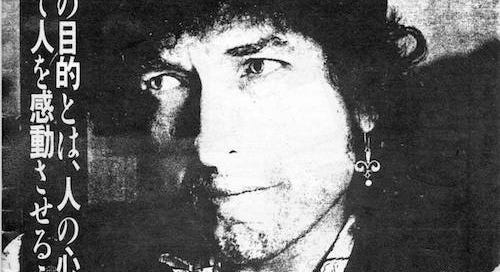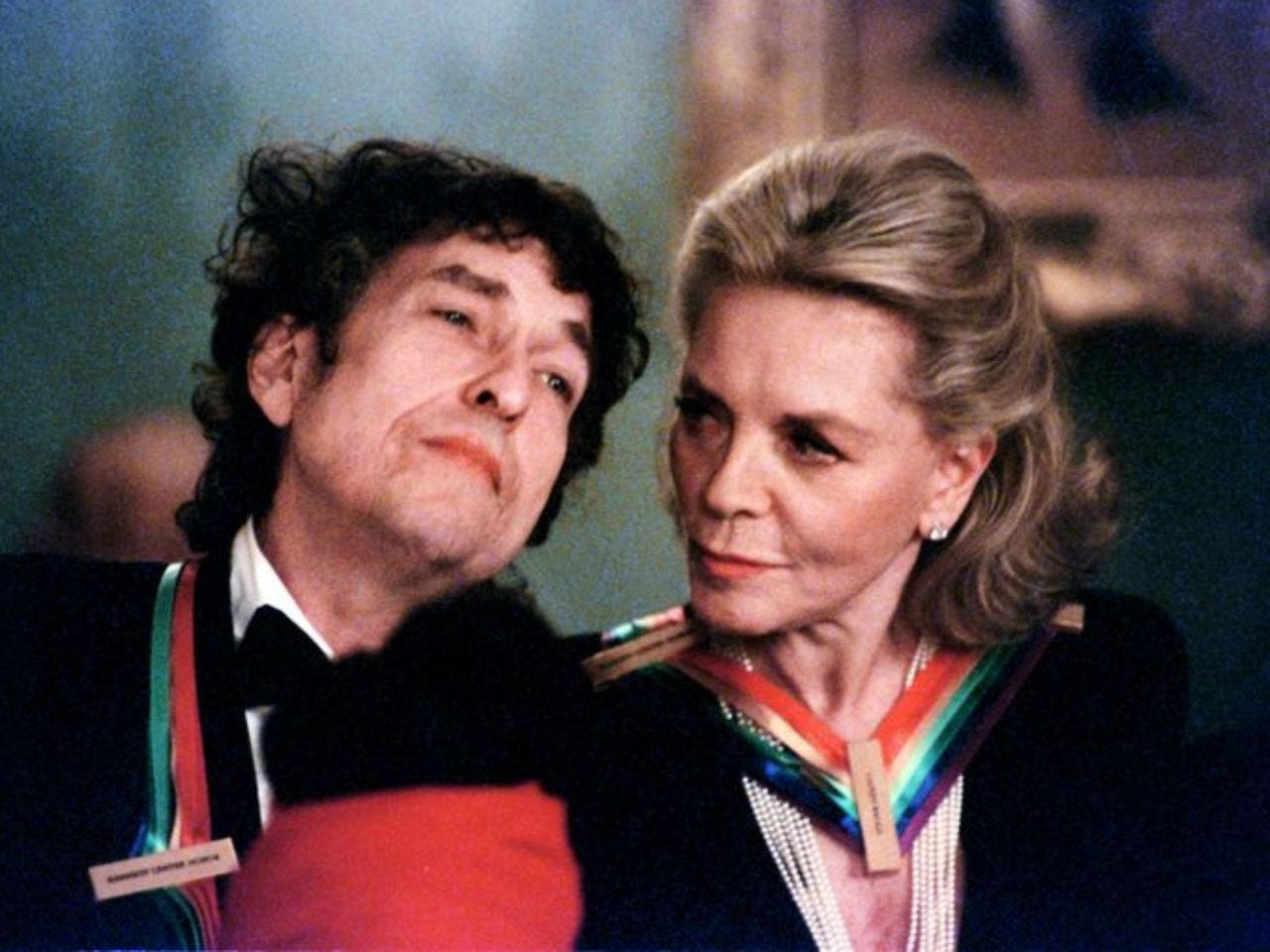Flagging Down the Double E’s is an email newsletter exploring Dylan shows of yesteryear. If you found this article online or someone forwarded you the email, subscribe here to get a new entry delivered to your inbox every week:
We’ve got a special guest post today from a man some of you might know well: Dylan scholar James Adams aka. @bob_notes. If you don’t follow him on Twitter already, you really should. He shares fascinating insights on Dylan as well as rare magazine and fanzine clippings impossible to find anywhere else. (For instance, did you know Bob was apparently considering joining a new incarnation of the Dead three months after Jerry’s death? I didn’t!)
“What goes through my mind is just … are these the right songs for this particular crowd?”
Bob Dylan, CNN interview with Dennis Michael, 1993
Richard Manuel is dead. A suicide, four nights ago, in a Florida hotel room. Bob Dylan is on tour with Tom Petty and the Heartbreakers on the opposite side of the world, but you have to imagine that he knew the bad news by the time he took the stage in Nagoya, on 8 March. Add Richard to the growing list of the recently departed in Bob’s circle. In just about the last five years: guitarist Michael Bloomfield, filmmaker Howard Alk, folk singer David Blue, gospel singer and evangelist Keith Green, and former manager Albert Grossman.
Dylan was downright verbose onstage in 1986, particularly when compared to his more recent tours. Tonight he’ll explain to the crowd that “everybody must get stoned,” has multiple meanings and that “Ballad of a Thin Man” is a song about putting someone in their place. And then, just before a fantastically fiery version of “Lenny Bruce,” Dylan gives an extended monologue comparing Bruce to other underappreciated innovators who didn’t get their due, dead too soon in hotel rooms, while others are celebrated and profit in their wake.
A handful of Dylan commentators, including Ian Bell, Michael Gray, and Clinton Heylin, have written about this moving moment onstage in Nagoya. It’s easy to hear it as a tribute to Richard Manuel.
Except that Dylan’s introduction to his song about Lenny Bruce was actually about Tennessee Williams, not Manuel:
All right, here's a song about recognition. Or lack of recognition. Tennessee Williams, it was he who said "I don't ask for your pity, just your understanding. Not even that, but just your recognition of me in you. At times the enemy in us all." Anyway, Tennessee Williams, he got a pretty drastic life too. He kind of died all by himself in a New York City Hotel room. Without a friend in the world. Another man died like that, except Tennessee Williams did have some success. This man didn't have too much success, but he started a lot of people off. People who came, picked up on what he did and took it someplace else and made a lot of money and became very successful. And he died in a lonely grave.
Given the subject and mood, it’s tempting to consider the possibility that Dylan was referencing Manuel indirectly, that he was commenting on a contemporary tragedy by recalling another that came before. But the timeline doesn’t fit. Dylan first deployed his Tennessee Williams monologue on 15 February 1986. He gave similar versions of the rap onstage at least three times before Manuel died, and maybe more. (Recordings from some of the True Confessions Tour shows in Japan don’t exist or don’t circulate and we can’t check what Dylan said at those performances).
So, what’s going on here? Is it weird that Bob Dylan would spend a considerable amount of time on tour in Japan talking onstage about Tennessee Williams, and half-butchering lines from Williams’s 1959 play Sweet Bird of Youth? Of course not! This is Bob Dylan, the King of Capriciousness, we are talking about. Someone obviously re-sparked Dylan’s interest in Tennessee Williams during the tour and he carried that inspiration around for the next couple of weeks.
That someone was almost certainly Lauren Bacall. Bob and Bacall spent time together in a hotel bar in Sydney, Australia on 10 February. The next day, Dylan attended a matinee performance of Sweet Bird of Youth she was starring in. That’s where he heard the Tennessee Williams lines he’d recite with varying degrees of accuracy during his own shows. (Eleven years later Dylan and Bacall received Kennedy Center Honors together. Look at the pictures from that night and you can imagine him whispering: “Remember that night in Sydney?”)
But references to Tennessee Williams—both direct and oblique—have dotted Dylan’s work since almost the very beginning. Take, for example, Dylan’s 1965 song “Love is Just A Four Letter Word.” Dylan probably appropriated the phrase from Williams and used it for a song title and refrain. Perhaps it came from Williams’s 1953 play Camino Real (“And love? That’s a four-letter word which is sometimes no better than the one you see printed on fences by kids playing hooky from school.”) More likely, Dylan heard the phrase as dialogue in the popular 1958 film version of Williams’s Cat on a Hot Tin Roof, from a screenplay written by Richard Brooks and James Poe.
Years later, Dylan would again work Tennessee Williams references into his songs. There is a nod to A Streetcar Named Desire in “Tweedle Dee & Tweedle Dum,” from Dylan’s 2001 album “Love and Theft.” And a lyric from the year before, “don’t get up gentlemen, I’m only passing through,” is more than a bit reminiscent of a Blanche DuBois line from that same play: “Please don’t get up. I’m only passing through.” Vivian Leigh delivered the line in the famous film version from 1951, from a screenplay Williams wrote himself. Dylan’s version of the phrase appears in “Things Have Changed,” a song that, like the best Tennessee Williams plays, “doesn’t pussyfoot around or turn a blind eye to human nature.”
In the first season of his fantastic Theme Time Radio Hour show, on an episode about Tennessee (the state), Dylan called Tennessee Williams “one of my favorite playwrights,” and gave a gnarly reading of Big Daddy’s mendacity monologue from Cat on a Hot Tin Roof. In Chronicles, Dylan recalls a Tennessee Williams literary festival occurring in New Orleans on the sidelines of the Oh Mercy recording sessions, and how Williams’s plays were stiff on the page but better in person, where one can experience “the full freak effect.” Tantalizingly, Dylan also writes that he met Williams in the 1960s, and that the man “looked like the genius he was.”
Williams, who died in 1983, was a Bob Dylan fan. In an interview a year before his death he said:
Bob Dylan speaks to me. I think we're on similar paths—of reinvention, of discovery, of telling a story, of trying to matter…There is such a lovely yearning in Dylan's songs, in his voice, in the construction of his lyrics. For me—for this writer—yearning is walking, crawling, perhaps, towards some understanding, and I can listen to him, and I can lose myself in the journey he has constructed, and I can be saved.
The songs and the journey and the storytelling bring us back to that moment introducing “Lenny Bruce” onstage in Nagoya. Who knows what goes through the man’s head when he takes the stage? What was he thinking when he looked into that crowd in 1986? What will it be the next show starts? We don’t know and we never will.
That doesn’t mean we can’t take Dylan’s word for it, as hard as that can be sometimes. Let us take it on faith that what Dylan said in 1993 is true, and, when he looks out at all those faces, he is indeed thinking about whether or not the songs will work for us, his audience. Then listen to the way his voice cracks with tenderness and fatigue during “It Ain’t Me, Babe.” Get caught up in the sweeping half-gospel of “Just Like Tom Thumb’s Blues.” Enjoy the eight different covers performed with obvious enthusiasm, including one—“That Lucky Old Sun”—that would find a home on a Dylan studio album almost thirty years later. And yes, consider the way Dylan remembers and resurrects the dead during “Lenny Bruce.”





That Tennessee Williams quote about Bob is wonderful. I haven't seen that before.
Thanks. Great blog. I've subscribed.
Chris
Life can be so sad!